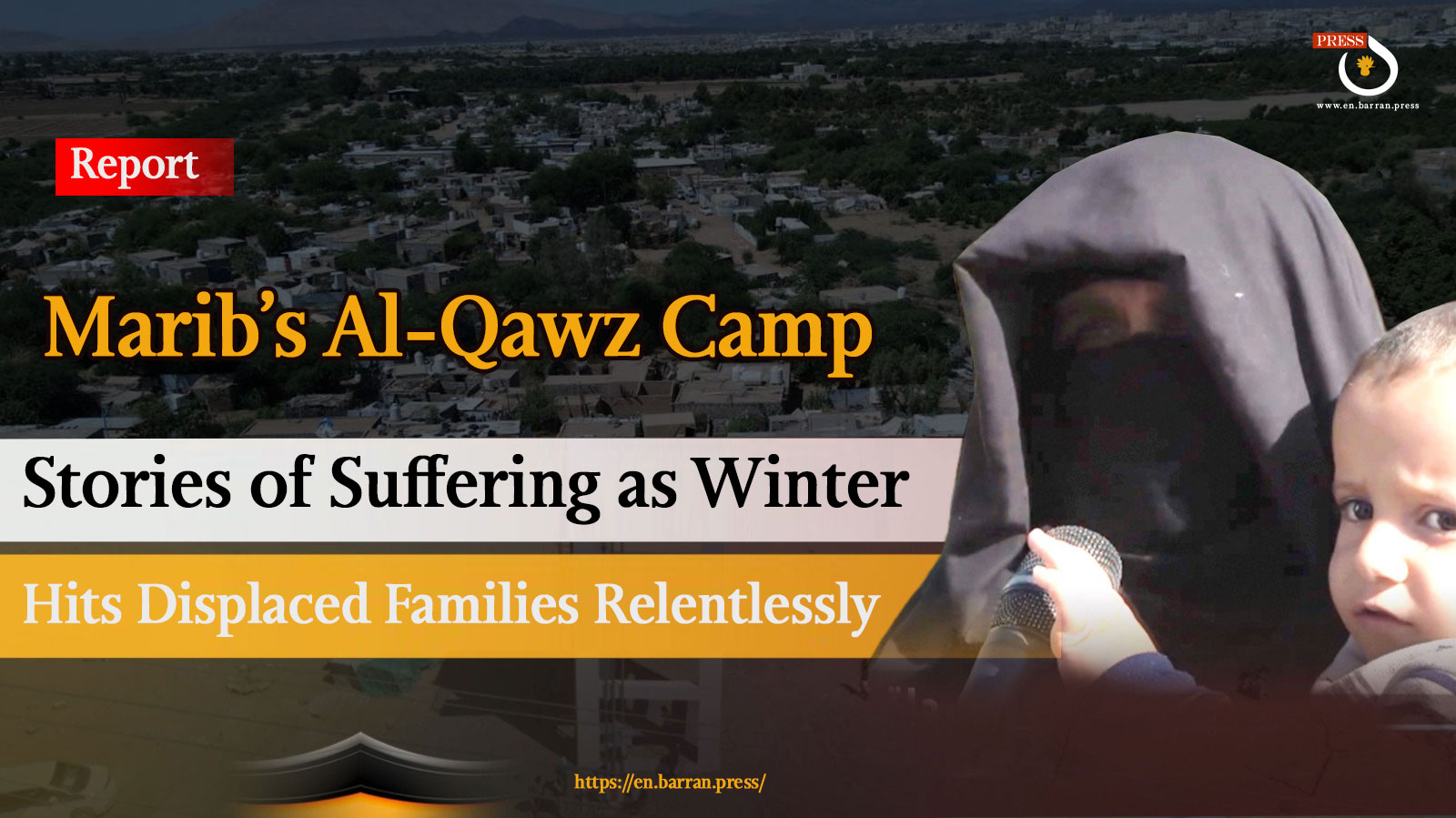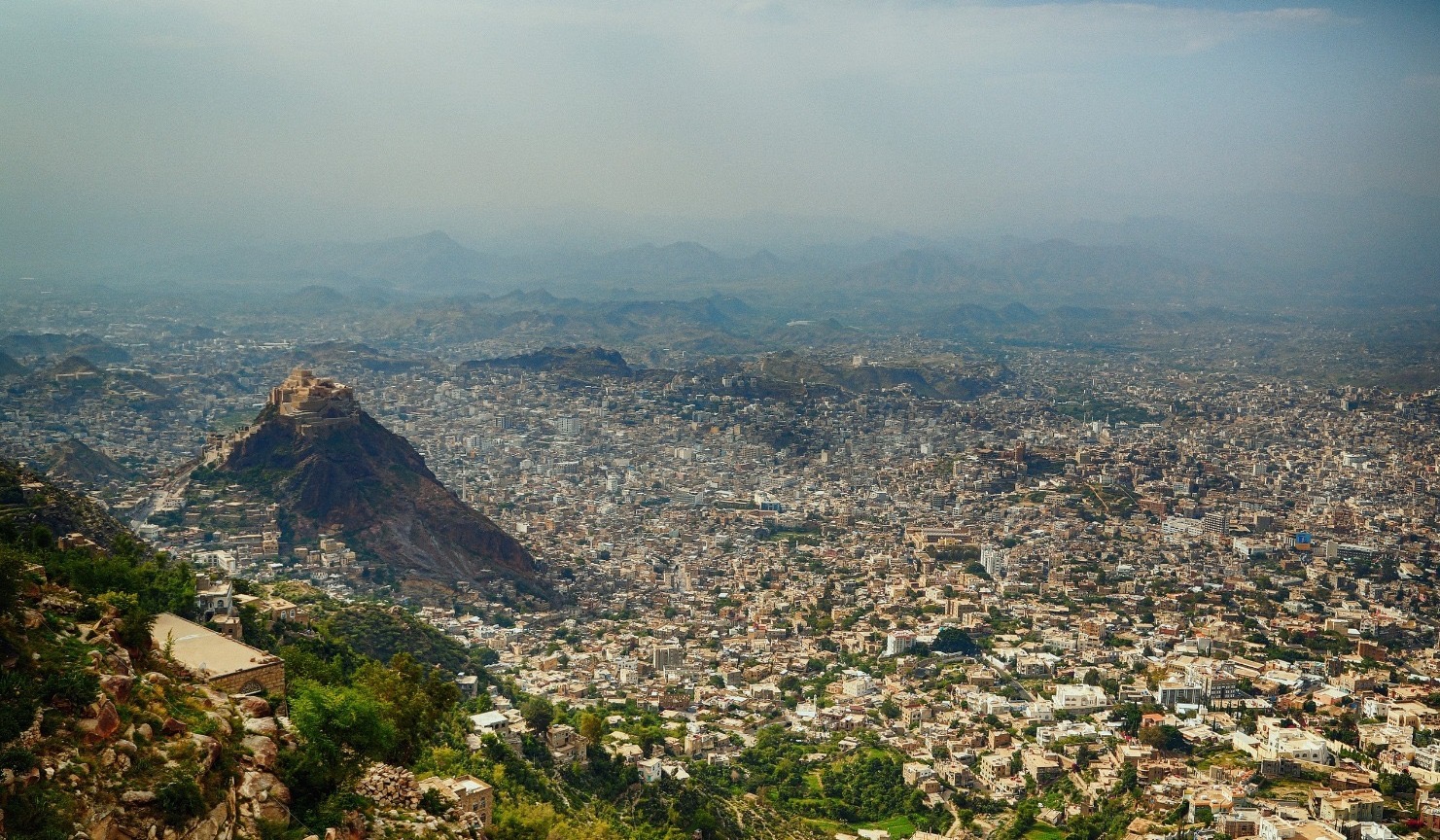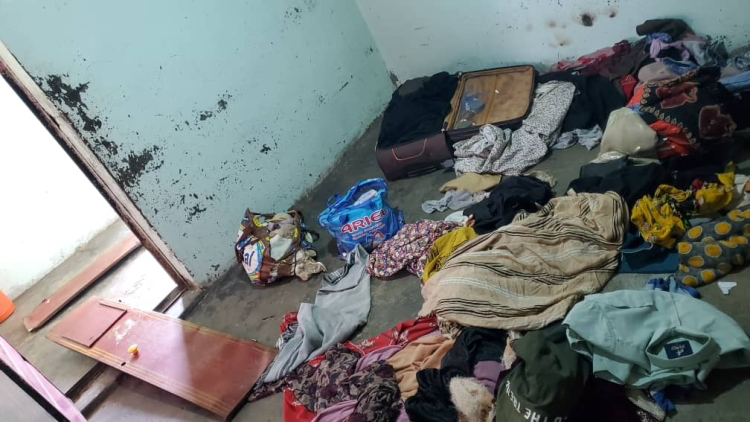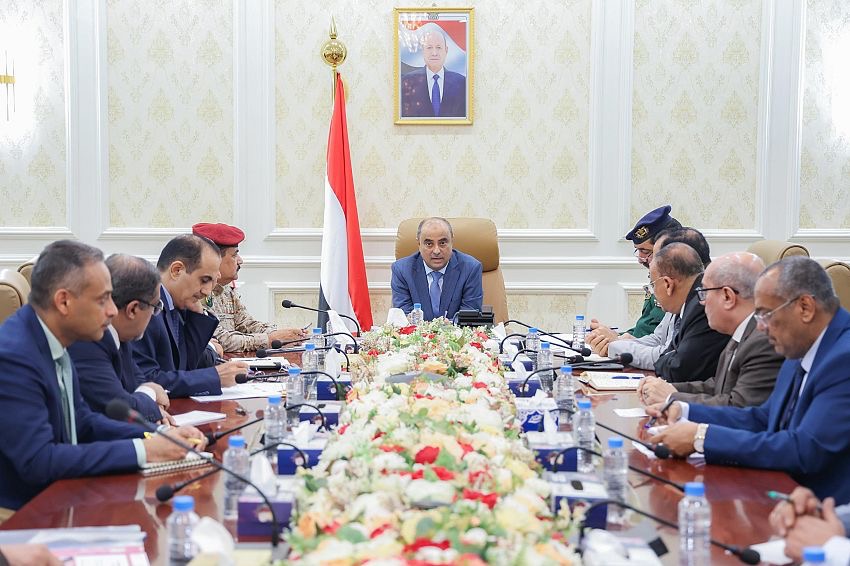
Barran Press - Naif Al-Jarbani
MARIB, Yemen — Under tattered tents that sway in the biting cold, hundreds of thousands of displaced individuals in Marib Governorate are enduring a merciless winter, exacerbated by a significant lack of humanitarian intervention from international organizations.
In the scattered displacement camps surrounding Marib city, the stark reality is evident: families grapple with severe shortages of food, winter clothing, medical supplies, and basic necessities, making daily life increasingly difficult.
The Executive Unit for the Management of Displacement Camps in Marib has issued an urgent appeal to save the lives of 203,000 families living in makeshift shelters that offer little protection against the harsh cold, warning of life-threatening risks to thousands of children and the elderly.
Bran Press visited several displacement camps, including Al-Suwaida, Al-Qawz, and Al-Mil, to witness the conditions faced by the displaced as winter intensifies.
The Al-Qawz camp, located southeast of Marib city, hosts 510 displaced families, totaling 2,431 individuals, according to a survey conducted by the International Organization for Migration in October 2022. Most families hail from the Al-Mahra district in Al-Hudaydah Governorate, with others from Nham and Habish districts in central Yemen.
Many residents in the camp are families with children, individuals with disabilities, the elderly, and dozens of pregnant and nursing women. Food, clean water, and cash assistance are among their most pressing needs.
Battling the Cold
As winter sets in, the camp has become a battleground against the relentless chill, with inadequate heating, insufficient winter clothing, and a scarcity of food and clean water. Children, vulnerable and frail, bear the brunt of the bitter cold.
With minimal resources, displaced resident Amin Abdullah Omar fights against the cold, relying on thin blankets meant for summer distribution. "The cold here in Al-Qawz is severe; it tears at the skin and harms the displaced," he told Bran Press.
Amin adds, “This winter is exceptionally harsh compared to previous years. The cold feels like frost.” He notes that 95% of displaced residents have only makeshift tents and desperately need winter clothes and blankets, lamenting the dire living conditions and lack of income.
A Fridge-Like Winter
Abdullah Shawqi Mahdi, another displaced individual from Al-Hudaydah, likens the camp’s cold to "the chill of a refrigerator," highlighting the extreme conditions faced by him and thousands of others this winter.
He reports that children are frequently suffering from fevers and coughs due to the intense cold and lack of heating. The elderly, too, are falling ill from the cold, as even two blankets fail to provide sufficient warmth.
Regarding housing, Abdullah explains that most shelters consist of makeshift materials that offer little protection from the elements. He emphasizes a critical shortage of food assistance from relief organizations, stating, “With rising prices and a depreciating currency, displaced families struggle to provide for themselves.”
The absence of adequate healthcare and medications for common ailments, such as fevers, remains a dire concern. As the cold deepens and needs grow, the plight of the displaced in Marib continues to worsen, reflecting a humanitarian crisis that demands urgent attention.
beyond belief
During a visit to the Al-Qawz camp, where many residents shared their struggles, one common complaint emerged: the unbearable cold that relentlessly assaults their bodies within the dilapidated tents.
“The cold is extreme; children and the elderly cannot endure this year’s chill. The situation is dire, and food is scarce. I urge the relevant authorities to fulfill their duties towards the displaced,” lamented Muhammad Ali Jaber Al-Mohamadi, a resident of the camp.
Among those we met was Um Ibrahim, whose story illustrates the depth of hardship faced by many. In addition to battling the cold and its associated illnesses, she suffers from gout and other health issues, while her son struggles with diabetes and mental health challenges. “We live in dire humanitarian conditions,” she told Bran Press. “We find some relief from the cold during the day, but at night, it becomes unbearably cold. We don’t know where to go.”
Deaths and Fires
Al-Qawz camp is particularly vulnerable due to its elevated location, where tents offer little protection from the cold. Many families share a single room, while others sleep in tents. Sultan Ma'idh, a resident from Al-Mahwit, confirmed that there have been fatalities in the camp due to severe cold and inadequate protective measures.
“There is no medical facility in the camp; the cold causes fevers and coughs, and children have died due to a lack of medicine and the inability of families to reach medical centers,” he said. He noted that the blankets provided are insufficient for warmth, adding, “We are struggling with a shortage of blankets and winter clothing.”
In a makeshift shelter made of flammable materials, Abdullah Hassan Khiban, a resident from Al-Durayhimi in Al-Hudaydah, described how the cold prevents him from rising in the morning without assistance from his children. He waits for the sun to rise before attempting to walk.
With their shelter made from flammable materials, Abdullah and his family cannot use heaters for fear of fires. He recounted witnessing children burn in front of his eyes due to heating equipment catching fire.
Unfulfilled Promises
Abdullah Dubish Ayesh Al-Zarnouqi spoke of unfulfilled promises from the International Organization for Migration to build sustainable housing for displaced individuals that would protect them from climate changes. “They gave us forms to sign and offered 600,000 riyals to build shelters, but what can I do with this amount when I have no other source of income?” he questioned.
Regarding food assistance, resident Yahya Ibrahim Osman Khalil stated that food aid has become irregular. “The World Food Program used to provide regular assistance, but now we receive only 20 kilograms of flour every six months, and the rice is unfit for human consumption,” he said.
Omar Al-Hamdani highlighted the inadequacy of humanitarian interventions, stating, “The amount of assistance is minimal and does not meet our needs. The World Food Program distributes aid every two to four months.”
Lack of Medical Care
As complaints about the lack of medication and healthcare services grew, we visited the health center in the camp, which consisted of two poorly equipped rooms that barely met the definition of a clinic. There were no medications or medical staff available.
Nurse Razqa Al-Awadi confirmed the residents' concerns, saying, “This is just a simple center; we have no medications or first aid. We can only offer pain relievers.”
She added, “We see over 35 patients a day but cannot provide adequate treatment. We have only rehydration solutions and cough syrup; we lack any real medications.”
The majority of cases brought to the center are related to fevers and diarrhea due to the severe cold, and Razqa emphasized the need for proper medications, a laboratory, and a general physician.
Leaving the camp, the images of suffering lingered in our minds. The displaced individuals require not just emergency aid but also sustainable solutions to alleviate their suffering and restore hope for a return to the homes and villages they were forced to abandon due to the Houthi conflict.
Low funding
The dire situation has raised questions about the role of humanitarian agencies. Amin Al-Maqbool, coordinator of the Shelter and Non-Food Items Cluster in Marib, attributed the worsening conditions and inadequate responses to a "sharp decline in funding."
Al-Maqbool emphasized the urgent need for winter support, including insulated clothing, blankets, and heating supplies, particularly for the most vulnerable populations—children, the elderly, and those with chronic illnesses or disabilities. He noted that nearly 655,000 people across 30 districts require winter assistance, with 232,000 individuals at risk of freezing temperatures. However, the cluster’s capacity to respond remains limited.
According to the cluster’s 2024 plan, approximately $8 million is needed to meet winter support requirements.
Gaps in Aid and Justifications
Despite the significant presence of displaced individuals in Marib and the increasing need for humanitarian interventions, Seif Muthana, director of the Executive Unit for Displacement Camps, stated that international organizations lack a “real presence” in the governorate. He described a “huge gap” in interventions compared to the scale of need, while many organizations cite funding shortages due to crises in other countries as justification for their inaction.
Muthana also pointed out that the main offices of international organizations in Sana’a, controlled by the Houthi group, pose obstacles for effective humanitarian work. “The presence of offices in Sana’a exacerbates the suffering of the displaced,” he said, adding that it enables the Houthi group to interfere and disregard humanitarian standards.
He reiterated calls for these organizations to establish their main offices in Marib, which houses 62% of Yemen’s displaced population. Muthana stressed the importance of implementing sustainable housing solutions that preserve the dignity and privacy of the displaced.
With the start of 2024, Muthana announced that, in collaboration with local authorities, land has been allocated for the construction of permanent housing units. “We provided 14 plots of land for vertical housing,” he said, underscoring the need for innovative solutions amid land scarcity.
He referenced humanitarian laws that require organizations to transition from emergency projects to sustainable initiatives after seven to eight years. “We are now in the 11th year and remain in emergency projects, which exacerbates the humanitarian situation for those in camps,” he noted.
Overall, Muthana lamented the lack of response from international organizations to support sustainable housing projects, urging a shift towards long-term solutions.





